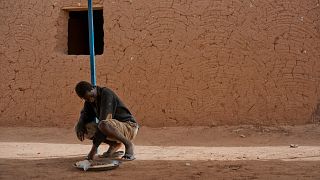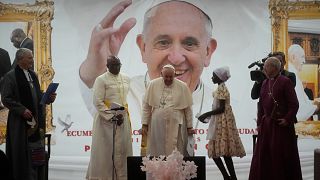Paralympic Games
When Parfait Hakizimana learned he would be competing in the Tokyo 2020 Paralympic Games, he was overjoyed.
"I saw it as a kind of door opening for me," he says, beaming with pride as he laces up his shoes outside his home in the Mahama refugee camp in Rwanda.
For Parfait, 32, the road to this defining moment has been fraught with obstacles that began when he was just a boy in Burundi.
His life changed forever at the age of six, when he was shot in the left arm by men who attacked his hometown near the capital, Bujumbura. That was also the day his mother was killed.
"It was the worst obstacle I have ever faced in my life. I was heartbroken. It is an unforgettable day in my life," he says.
Parfait spent nearly two years in the hospital recovering. He lost most of his left arm and has since had to rely primarily on his right arm.
"Sports helped me overcome the pain I experienced as a child."
A few years later, when he was 11, his father died in a motorcycle accident.
Orphaned and alone, Parfait sought refuge in school and sports.
"Sports especially helped me to overcome the pain I experienced as a child," he recalls. "It's a protection for me.
Indeed, Parfait excels in sports activities, especially martial arts. He discovered taekwondo and began participating in various national and regional events, winning several trophies and medals.
When post-election violence broke out in Burundi shortly after the 2015 elections, Parfait was forced to leave everything behind and flee. He found safety in Rwanda, where he was able to find a vibrant sports community. Within a year, he started a taekwondo club and hundreds of Burundian refugees signed up for classes.
Now a black belt and certified coach, Parfait trains 150 refugees, including children as young as six.
The sport is attracting widespread interest in the Mahama camp, which is home to more than 46,000 refugees, mostly from Burundi. UNHCR, the UN refugee agency, launched a "Sports for Protection" program in 2017 that aims to use the transformative power of sport to engage youth, protect children, and foster inclusion and peaceful coexistence between refugees and their hosts.
Emilia Nuiselle Lobti, a UNHCR protection staff member based in Kirehe, says that clubs like Parfait's are essential to achieving the program's goals.
"There are many sports clubs here, which shows how much the refugees love sports. But sports is much more than a leisure activity. It's an opportunity for them to be included and protected and a chance to heal from past trauma, develop and increase their skills," she explains.
UNHCR's partnership with the International Olympic Committee (IOC), the International Paralympic Committee (IPC) and other partners has seen refugees participate in the Olympic and Paralympic Games in Rio in 2016 and this year in Tokyo, where the Paralympic Games will begin on Tuesday, August 24. UNHCR is leading the global call for a world in which all uprooted people, including people with disabilities, can access and participate in sport equally.












02:35
Sudanese Refugee Children Find Hope in Libyan School
01:05
Sudan: fire in Darfur refugee camp destroys 50 houses, no casualties reported
Go to video
Rwanda commemorates the 1994 genocide that claimed at least 800,000 lives
Go to video
Kenya's ambitious plan to turn Kakuma refugee camp into a city
02:26
Mixed feelings in Goma ahead of DR Congo's talks with M23 rebels
Go to video
Rwandan government announces death of deputy spokesperson Alain Mukuralinda